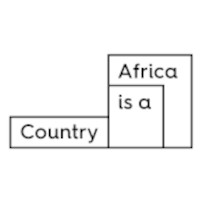Zimbabwe is not Mugabe, Nkomo, Mnangagwa or Chamisa. A new Afro-electronic music duo is giving the country’s complexity a soundtrack.
Banut Spaship. Photo © Wonai Haruperi.
Zimbabwe is changing. Old histories are being repurposed, and lovingly so. New ways of expression are taking root. Away from the macabre theater of politics something new, yet unmistakably Zimbabwean, is expressing itself.
I was deep inside the labyrinthine innards of what was once a multi-storey department store in downtown Harare when I first saw this new Zimbabwe. A cavernous space gutted by time and rust had been refilled and revived under the guise of the Fabrik Party, the brightest new light on Harare’s events scene, and there was fashion and art everywhere I looked, urban youth landing ollies on battered skateboards within an impromptu indoor skatepark on one side, the chaotic joy of a collaborative musical stage on the other. Now, that new scene has a soundtrack. Bantu Spaceship has released a self-titled debut album that is one of the most exciting Zimbabwean musical projects in at least a generation.
Bantu Spaceship is an experimental Afro-electronic music duo, featuring the eclectic vocal talents of Ulenni Okandlovu and the joyfully otherworldly production of Joshua Madalitso Chiundiza. Theirs is a hybrid sound, merging synth wave and electro with Mbaqanga, Zamrock, Sungura, Jit, and Chimurenga music. Okandlovu’s vocals shift through spoken word, mbube, and harmonies evocative of the LMG Choir, Chiundiza’s productions from tripped out dance party to an ethereal soundscape. They call it New Jit Wave, but it’s music that quickly slips the bounds of classification. It just is.
“We roamed about in the same circles in the art scene and really came together because of the similarities in musical taste,” Chiundiza says, explaining Bantu Spaceship’s backstory. “We were both keen to make music that was a bit different from the usual, but we ultimately wanted to make something that was influenced by the sounds we grew up on.”
Chiundiza’s history as a member of The Monkey Nuts, an experimental hip-hop crew, was vital to the genesis of the partnership. As Okandlovu tells it, he moved from Bulawayo to Harare about 10 years ago and was immediately entranced when he saw The Monkey Nuts perform at The Book Cafe, an iconic arts center. Fast forward a couple of years, and Okandlovu was spending a lot of time at the art studio of Kresiah Mukwazhi and Tinotenda Tagwireyi, who was also a member of The Monkey Nuts. There, he met Chiundiza, and soon they started making music together.
To call the resulting album Afrofuturist seems somehow restrictive. There is Afrofuturism within it, but it’s also an evolving project that is continually redefining itself. “Each and every song evolves with time,” explains OkandlovuWhat you hear on the album and what you hear in the live show is evolution and growth, from where the studio recordings left off. It keeps continuing, the sound, our catalog of it. We get in the studio, create what we’re creating, if we love it, we can repeat it tomorrow, or perform it, or record it. And it keeps building and building based on what we discover each and every day.
From the delicate and crystalline opener, “Journey to Misava,” inflected by Okandlovu’s spoken intro and Thandi Ntuli’s voice and jazz piano, the album gets immediately into the sadza and nyama, with the generous sampling of Sam Mabukwa’s guitar work and tracks such as “Bantu Cakes,” “Don’t Break,” and “Bantu Electro Sungura,” sounding as though they would be equally at home in Saul Williams’ “Neptune Frost” as they would bursting out of the sound system of a clandestine speakeasy on either side of Harare’s Samora Machel Avenue. Or, for that matter, an underground house party in Mzilikazi in Bulawayo. And that’s one of the keys to this album: Its roots are neither sungura nor mbaqanga, but both. It is not Shona or Ndebele, but both. It contains multitudes, a complete window onto a complex, variegated country. This is Zimbabwe, in 2023. Given the unresolved complexity in the relationship between Mashonaland and Matabeleland in Zimbabwe, the combination feels like a particularly poignant one. “Sound is profound in the way that it captures stories and histories. For us it’s more important not to dwell on our differences but to acknowledge and honor them for the positive effects that they can have on society,” suggests Chiundiza.
“Really there is nothing much to say about it, and at the same time there is so much to say about this being a collaboration between somebody from Matabeleland and somebody from Mashonaland,” adds Ukandlovu. “Josh was somebody who was curious to learn, and so was I, to learn about Shona culture. But it was nothing difficult to come together. And that’s a good thing, to interpret those elements and find a way of creating this as a Zimbabwean sound. Not as a Ndebele or Shona or tribal sound, but just as a Zimbabwean sound.”
To listen to this album in its entirety is to be willingly overwhelmed with the feeling that this is creation in its purest, protean form. Sui generis and gestalt, while honoring the ancestors. The start of something entirely new, yet rooted. And if it’s a view of the future, informed by the past, its outlook is inherently optimistic. This is music that says live immediately. Dance while you can.
There’s plenty to dance to. A glitched-out electronic version of the traditional song “Mhondoro,” which samples Robson Banda and the New Black Eagles’ “Dzinomwa Muna Save” has been knocking around on Soundcloud for a couple of years. Here it finds its final form. “Mqibelo (a Prayer for the Weekend)” features a verse by Kwela Sekele, and is perhaps the high watermark, while “Misava The Arrival” sits like a budding kernel at the heart of the album and sounds like a manifesto for the entire project. A selection of remixes from South African DJ and producer Kid Fonque round out the piece—one that only gets better and better with repeated listens, and leaves the listener wanting more. Thankfully, there should be more coming, Okandlovu assures:
The project is like a research project and the album is like a dissertation. There are so many ways of researching and archiving information and sound. And besides the sounds, there’s so much more that we learned and discovered, and our form of art is a combination of audio, sound, and then video art as well, so it’s a whole project. We still have to put up other parts as video art, and put up other elements, like a documentary or something like that. So we’re still exploring a lot of mediums and ways of presenting the findings and things that we want to preserve, or things that we want to talk about.
The combinations achieved by Chiundiza and Okandlovu feel so fresh, yet so inevitable, that one wonders why there aren’t more young Zimbabwean artists following their lead. “I’m not too sure why there isn’t more experimentation,” says Chiundiza:
I guess playing it safe offers more security in that your music can become popular and played on radio. And if you look at what’s happening across the continent with Amapiano and Afro-beats, it kinda makes sense to follow the trend. Unfortunately I don’t think enough Zimbabwean artists appreciate the fact that the South African and Nigerian musicians have simply been tapping into and innovating on their own musical heritage. Amapiano didn’t just come out of nowhere, you can literally trace its musical lineage if you play close attention. It’s the same with a lot of other genres like Hip Hop and Rock. Zim artists have a blueprint that they’re ignoring. We simply have to tap into our musical heritage and innovate.
It’s not just their music that is making a difference in this regard. Okandlovu is also the founder and creative director of The Fabrik Party, now in its third year and about to host its seventh iteration. “It’s about making space for creatives, creators and artists from the subcultures,” he says of the event. “It’s a space where we can share resources, bring in skills, put our different art forms together in one place, spotlight them, and give them a voice as a collective. And it’s still growing, very fast.
“There is so much that’s happening at the moment in Zimbabwe,” says Okandlovu. “I think it’s the best time to be in Zimbabwe right now, in terms of the creative work side of things. There is so much that has changed, and things are moving fast. From visual art to music and fashion there’s so much that’s going on.”
Zimbabwe is not ZANU or CCC. It’s not potholes, politics, Mbira, Mbaqanga, Shona, Ndebele, colony, an ancient kingdom, Mhondoro, or Mwari. It is not Mugabe, Nkomo, Mnangagwa or Chamisa. It’s not cricket or football. It’s not balancing rocks, or Zambezi, or Limpopo. It is neither rural nor urban. It is not the Pioneer Column or the Sipolilo campaign. It is neither the Rudd Concession nor the GNU. It’s not past or future. It’s all of these things and more. That complexity has a soundtrack. The most exciting thing is discovering what comes next.
Buy Bantu Spaceship’s digital album or limited edition 12” vinyl on Bandcamp.






